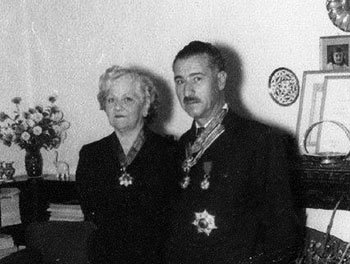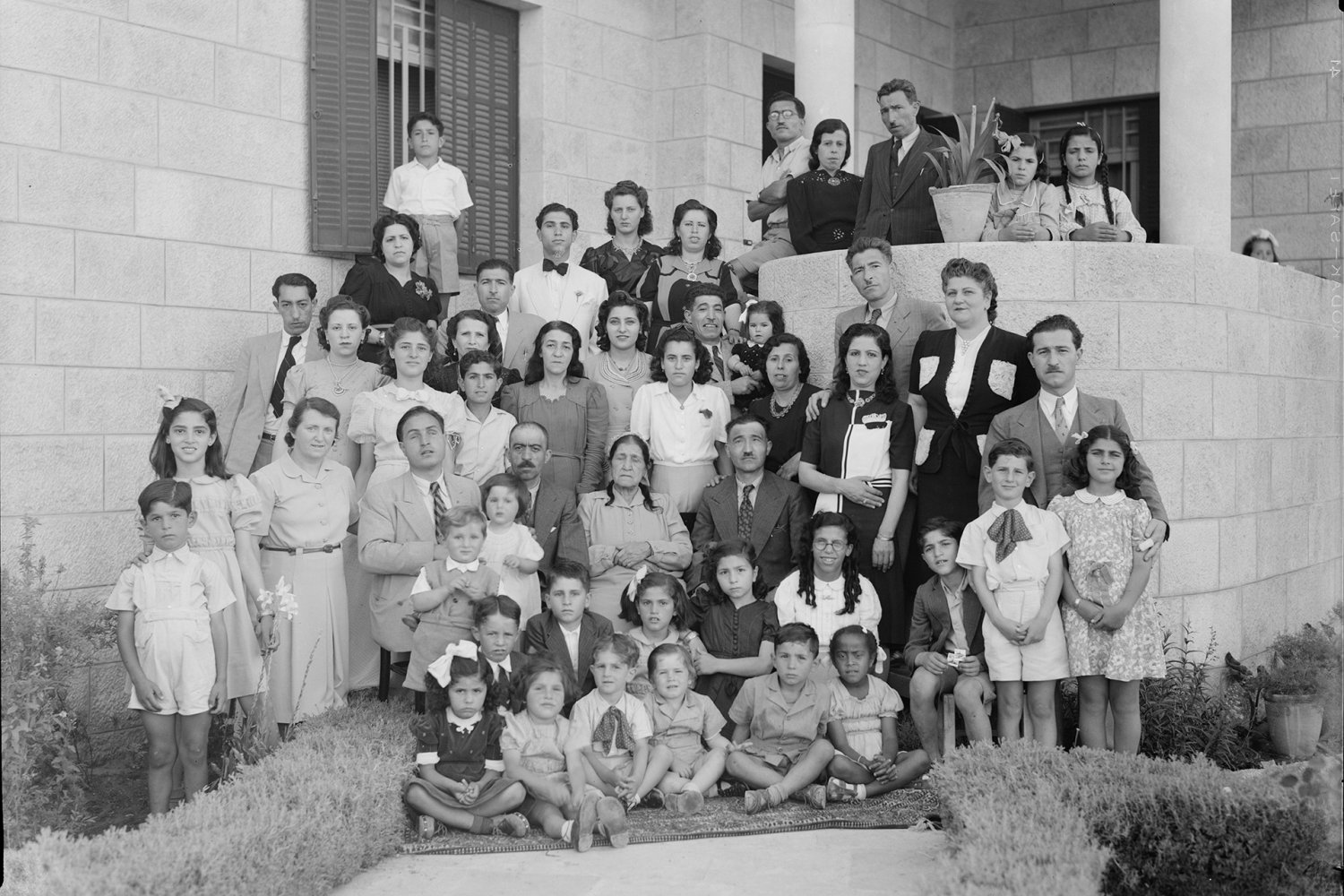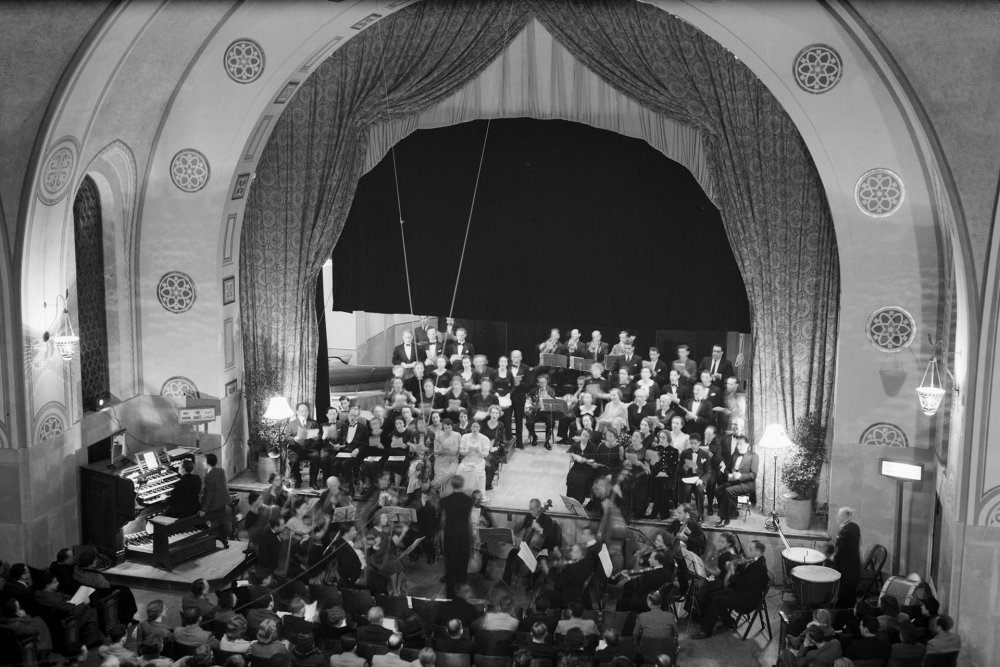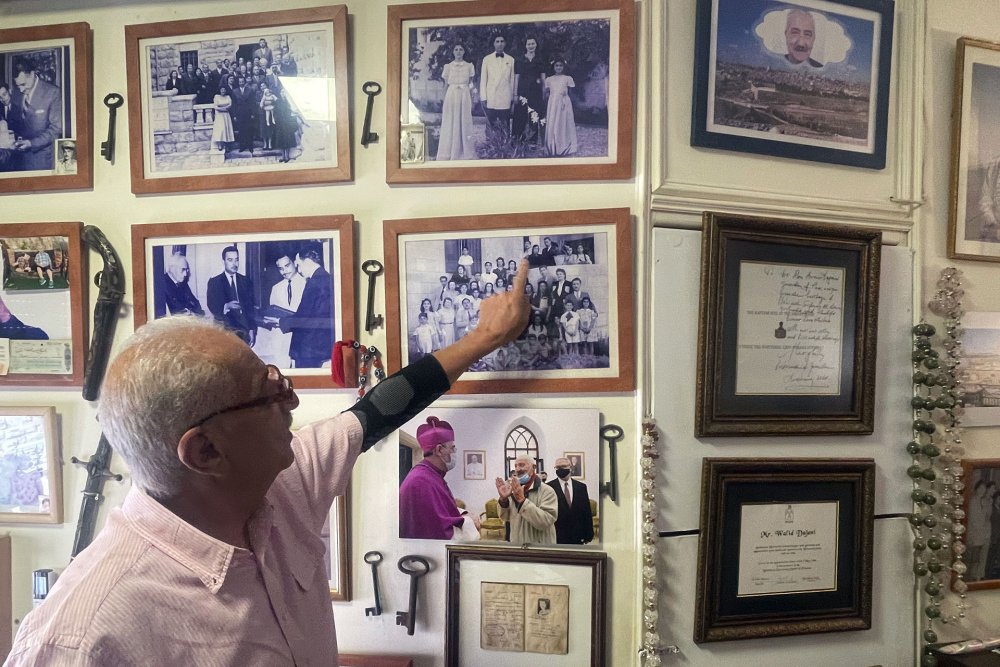Mahmoud Dajani was an accomplished medical doctor and surgeon who established clinics and hospitals in Jerusalem and the surrounding areas. He also helped establish the Palestine Red Crescent.
Early Years
Mahmoud Daoud Taher al-Dajani was born on October 7, 1907, into one of the largest and richest of Palestine’s merchant families during the Ottoman period. The roots of this prominent Jerusalem family go back to the 1600s.
He studied at al-Ma’muniyya high school and completed two years of study in Germany. He then returned to Jerusalem and received his matriculation certificate from the English College (a high school run by the British Anglican Church Mission Society in 1904). His high grades secured his acceptance at the medical school at the American University of Beirut (AUB), where he graduated with a degree in medicine and surgery with honors in 1932.
At the AUB, Dajani met Nahil Habboub, who was studying dentistry. They married, and when they both graduated, they went to Jerusalem to establish their practices.
Dajani remained closely affiliated with the AUB, even after his return to Jerusalem. He established (and remained actively engaged in) the AUB Alumni Association’s Palestine Chapter. This chapter became a valuable space for prominent Arab thinkers and intellectuals to raise awareness on issues related to political changes and medical needs in the region.
Setting Up a Practice in Jerusalem
Upon his return to Jerusalem, Dajani opened an outpatient (private) medical clinic on Ma’man Allah (Mamilla) Road just outside the Old City. His wife set up a dental practice at the clinic. She was the first female Arab (and Muslim) dentist in the region. They ran the clinic throughout the 1930s and early 1940s. They had three children: Adila, Nazih, and Raja’i.
Dajani lost his home in Qatamon during the 1948 War (as did the extended Dajani family members who had lived in the area that was ethnically cleansed of Arabs during the war and became West Jerusalem after it). His home was occupied by Israeli writer Amos Kenan, who was reportedly pleasantly surprised to find that the home he was taking over had an expensive rug and a piano. (Dajani was a self-taught pianist who was good enough to perform publicly at the YMCA and elsewhere.)
Mounir Kleibo, whose late mother was Dajani’s niece, recalls the story she had recounted to him about the family’s horror at losing their properties: Apparently, when Nahil (Dajani’s wife) returned to her house when hostilities subsided and learned that the house had been seized by a Jewish woman and that it was no longer theirs, she was so shocked that she fainted on the spot.1
Dajani and his wife treated injured Palestinians during the war and volunteered their services at the Arab hospital in Beit Safafa (among other places).
After the War
In the years after the war, Dajani went to villages and offered his services to the sick. He worked for several years in Bethlehem and Ramallah and became undersecretary of the Ministry of Health in the West Bank (1949–51).
In 1955, at the request of King Hussein of Jordan, he established the Hussein Hospital in Bethlehem. This became Beit Jala’s governmental hospital and offered obstetric services. In the 1950s, he worked at the Spafford Children’s Hospital in the Old City of Jerusalem. He went to Harvard Medical School in 1957 for specialization in pediatric surgery.
A few years later, Dajani established his private clinic in the Palestinian neighborhood of Beit Hanina in East Jerusalem, where he continued to work until he retired in 1975.
Two years before his retirement, his son Raja’i expanded the clinic and established the Dajani Hospital for Child Delivery, which provided significant services for Palestinians in Jerusalem, particularly in obstetrics and in women’s, newborn, and childcare health. Although it is no longer functioning, the Dajani Hospital is still recalled by Jerusalemites.
Dajani provided consultations and had a pivotal role in the Red Cross and the Palestine Arab Medical Association. He helped to establish the Palestinian Red Crescent. His contributions were appreciated on the broader level, as he was a member of the Jordanian Senate (1961 and 1962). He was also member of the board of trustees of the University of Jordan in the early 1960s.
Lobbying for the Education Rights of His Blind Brother
Dajani’s contributions to his society were not limited to medical services, vital as they were. He is remembered by his family members for lobbying AUB administrators to admit his blind brother, Subhi. Refusing to take no for an answer, he continued to make the case that Subhi be given an admission exam and that his experience at the university could provide useful information about the needs of future blind applicants.
Thanks to Dajani’s insistence and Subhi’s proven abilities, Subhi was accepted—the first blind student in the AUB’s history—and went on to make substantial contributions to the education of blind students in Palestine.
Family Memories
This biographical sketch draws on the accounts of family members of Mahmoud Dajani, including his relatives Mounir Kleibo, Ola Dajani, and Abu al-Walid Dajani.
Abu al-Walid, who runs the Imperial Hotel near Jaffa Gate to this day, seems to have been especially close to his uncle, whom he referred to as a charismatic man of faith with political vision who was sought out by eminent figures. He shared:
He had such important and high-level visitors seeking guidance and advice from him, and his company was cherished. He was an avid reader. Among the things he told me, about his profession as a doctor, was that he didn’t see patients who died of poverty, but that he did see patients who died of overeating. He was full of wisdom and was an advocate for good health.2
Dajani had several avid hobbies, including painting and tennis. He was also known for his love and deep knowledge of gardening and planting.
Death
Dajani died on November 3, 1980, in Jerusalem. He was buried in the Bab al-Asbat (Lions’ Gate) cemetery.
Sources
Archives of the Jerusalemite Dajani-Daoudi Family. Accessed September 3, 2024. https://sites.google.com/site/dajaniforum/social.
Aydogan, R. Merve Demirkan. “Schools for the Holy City: Education, Imperial Loyalty and Missionaries in Late Ottoman Jerusalem, 1876–1909.” Central European University, 2020.
Barakat, Zeina M. “Bayt al-Dajani Daoudi: A Prominent Jerusalem Family Deeply Rooted in Palestinian History.” This Week in Palestine, no. 274 (February 2021). https://thisweekinpalestine.com/bayt-al-dajani-daoudi/.
Ben Badis, Anwar. “A Look at Qatamon: The House of Doctor Mahmoud Dajani.” [In Arabic.] Soundcloud, 2016.
Dajani, Ola. Email communication with the Jerusalem Story Team, May 29, 2024.
Dajani Daoudi, Abla Mohammad Taher. “Fallen Leaves Turn Back to Their Roots.” This Week in Palestine, no. 280 (August 2021).
“The Israeli Court Issues a Decision to Shut Down al-Dajani Hospital in Occupied Jerusalem.” [In Arabic.] Nablus TV. September 24, 2014.
“Mahmoud Taher al-Dajani.” [In Arabic.] The Hashemite Kingdom of Jordan: The Jordanian Senate. Accessed September 3, 2024.
Palestine Pictures. “Al-Dajani, Subhi Tahir (1910–1975).” Facebook, October 4, 2019.
Palestinian Heritage. Retrieved from Instagram, May 4, 2024.
[Profile Photo: Unknown]






